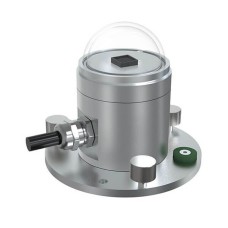|
For Downloads |
||
|
|
Setup
Software |
Testing
Software |
|
For Purchase |
Call / WhatsApp / Telegram:
+91 8148834200 |
|
|
For Technical Support |
Call / WhatsApp / Telegram:
+91 8148834211 |
|
Solar radiation sensor adopts
photoelectric principle and can be used to measure the total radiation value
under sunlight. The radiation sensor uses high-precision photosensitive
elements, wide spectrum absorption, high absorption in the full spectrum range,
and good stability. A dust cover with a light transmittance of up to 95% is
installed outside the sensing element, and the dust cover is specially treated
to reduce dust Adsorption can effectively prevent environmental factors from
interfering with internal components, and can more accurately measure solar
radiation.
This solar radiation sensor or
pyranometer is an instrument for measuring solar radiation. It measures the
solar energy received from the entire hemisphere (180 degree field of view).
Solar radiation varies significantly among regions. Season and time of day are
major considerations, but surrounding terrain elevation, man-made obstructions,
and surrounding trees can also cause large variations in locations with a small
area.
Datasheets
Power supply: 7V~30V DC
Working environment: -25℃~60℃, 0%~100%RH
Spectral range: sunshine
Measuring range: 0~1800W/㎡
Resolution: 1W/㎡
Response time: ≤20S
Non-linear: <±3%
Annual stability: ≤±3%
Wire length: 60cm can be customized
Output signal: rs485/0-5v/0-10v/4-20ma
Place or origin: China
Solar radiation meter features
1. Using
high-precision photosensitive elements, high absorption in the full spectrum
range
2. Comes with level meter and adjustment handwheel, convenient on-site
adjustment
3. High transparent dust cover, good sensitivity, special surface treatment to
prevent dust adsorption
4. Wide voltage power supply DC 7~30V
Use - Solar Radiation Meter
Solar radiation meter installation
1. Use
screws to pass through the mounting holes on the sensor to fix the sensor on
the mounting position
2. Make
sure the equipment is parallel to the ground (adjustable thumb screw and check
the state of the horizontal bubble to determine whether it is parallel)
3. After
the installation is complete, remove the protective cover

Solar radiation meter maintenance
1. The
dust cover needs to be kept clean and clean, often wipe it with a soft cloth
2. There
should be no water in the dust cover. If it encounters heavy rain, snow, ice,
and other long-term weather, it is recommended to cover it.

FAQ - Solar Radiation Sensor
Solar
radiation refers to the sun transmitting energy in the form of electromagnetic
waves, and the electromagnetic waves and particle streams emitted by the sun
into the universe. The energy transferred by solar radiation is called solar
radiant energy. The value of the solar constant published by the World
Meteorological Organization (WMO) in 1981 is 1368 W/m2. More than 99% of the
solar radiation spectrum of the upper boundary of the earth’s atmosphere is
between 0.15 and 4.0 microns in wavelength. About 50% of the solar radiation
energy is in the visible spectrum (wavelength 0.4~0.76 microns), 7% is in the
ultraviolet spectrum (wavelength <0.4 microns), 43% is in the infrared
spectrum (wavelength> 0.76 microns), and the maximum energy is at a
wavelength of 0.475 Micron.
Q: Why measure solar radiation?
The
annual total solar radiation refers to the amount of solar radiant energy
obtained in an area of 1 square centimeter in a year. Based on this, the
distribution of the total solar radiation in a region or a country can be
analyzed. There are two parts of solar radiation reaching the ground: one is
that the sun is directly projected onto the ground in the form of parallel
rays, which is called direct solar radiation. The second is that part of the
energy of solar radiation is scattered in all directions with these particles
as the center when it encounters air molecules or tiny dust. Part of the energy
after scattering is projected from the sky to the ground, called scattered
radiation, the sum of the two Called total radiation. It is the solar radiation
that reaches the ground, of which direct radiation accounts for the main part.
Pyranometer
is a device that measures solar irradiance from a hemispherical field of view
incident on a flat surface. The SI units of irradiance are watts per square
meter (W/m²).
Pyranometer Solar Radiation Sensor with RS485 Modbus Output (RS-RA-N01-AL)
- Product Code:
- Availability: Out Of Stock
-
Rs.9,986.00
Tags: pyranometer, solar, radiation, sensor, with, rs485, modbus, output, (rs-ra-n01-al)

